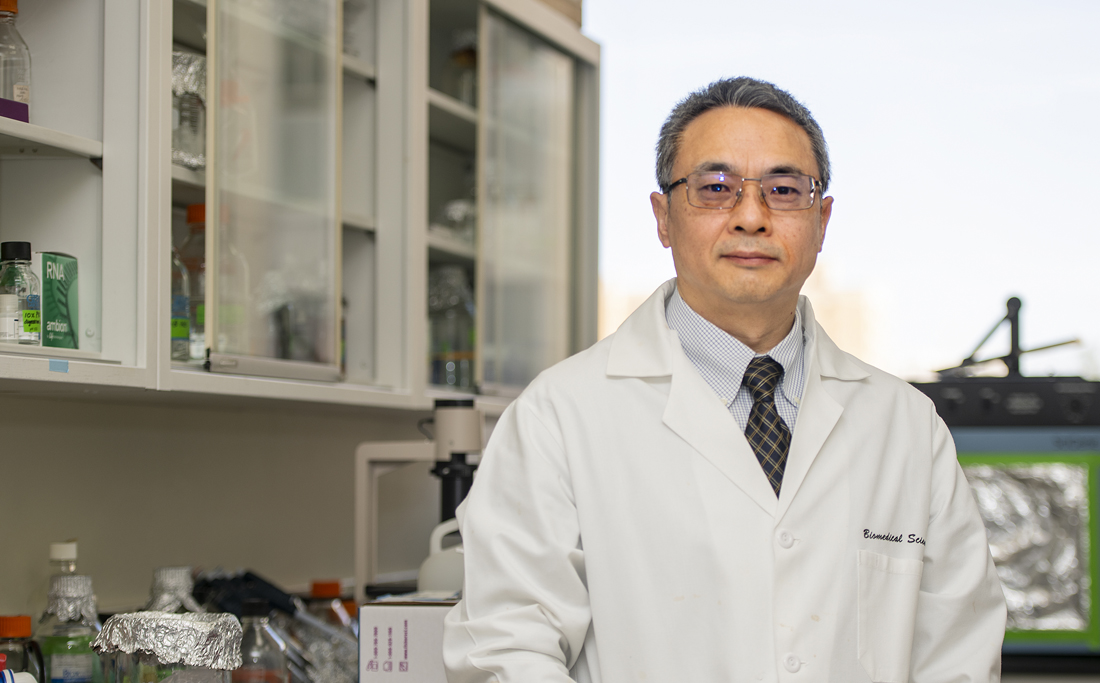Good things come in threes

A slew of research grants, strong departmental support, fulfilling mentoring roles and now a chance to grow his influence in the mineralized tissue world has Yongbo “Bob” Lu, associate professor in biomedical sciences, thinking that coming to Texas A&M College of Dentistry was the best decision ever.
As Lu proceeds into the new year, the good news seems to come in threes, as he is now immersed in his third National Institutes of Health R01 research grant, which he secured in 2020. In July, he becomes president of the Mineralized Tissue Scientific Group with the International Association for Dental Research, a three-year commitment that started with being chosen vice president-elect, president-elect and then president. And, this fall he’ll begin mentoring his third doctoral student, a role he cherishes.
Lu has wholeheartedly embraced his role as mentor to Ph.D. students as he guides them through their four-year program. His first student in the Ph.D. program in oral biology graduated in 2018, the second one is set to graduate next year, and the third should complete the program in 2025. He says his own similar path gives him added insight.
“It is my great pleasure to share what I have learned through so many years with those who would like to be devoted to biomedical research. It is also a privilege that I cherish most to interact with them on a daily basis, to see them become more and more knowledgeable and competent in their respective research project, and to influence them not only in science but also in daily life,” he says.
Lu, who has been studying mineralized tissue—including bone, dentin and enamel—formation and diseases for more than 20 years, says he also finds serving and advocating for the Mineralized Tissue Scientific Group as president a great honor.
His research focuses on understanding the functions of molecules that control tooth formation. That includes how gene mutations in teeth-forming cells alter functions and lead to tooth defects.
“Healthy teeth are essential for the overall well-being of a person,” he says of his research focus. “Enamel and dentin are the two hard tissues of a tooth and are formed by two different types of cells. Each type of cell expresses a unique set of genes.”
More specifically, Lu’s research concentrates on four genes—dentin matrix protein 1 (DMP1), dentin sialophosphoprotein (DSPP), FAM20C (Family with sequence similarity 20, member C) and FAM20A (Family with sequence similarity 20, member A) —that play a central role during tooth formation.
“Mutations in these genes in humans may affect the formation of dentin, enamel and the connective tissue cementum as well as the bone that supports the teeth, resulting in abnormal tooth shape and color, increased tooth wear, early tooth loss and/or periodontal diseases,” he says.
These patients may also suffer skeletal and renal abnormalities, among other severe defects. By studying these areas, Lu says he hopes to set the groundwork for developing “novel, effective and noninvasive therapeutic strategies” that will help prevent tooth defects that impact the patients’ overall health.
Lu joined the Department of Biomedical Sciences as a research assistant professor in 2009 after Dr. Rena N. D’Souza, department chair at the time, recruited him. Lu says the guidance of his College of Dentistry peers who are senior investigators led him to become an independent investigator and helped him secure an R03 grant in 2011 and his first R01 from the National Institute of Dental and Craniofacial Research in 2013.
“Since then, my research has been continuously supported by NIDCR,” he says.
In 2018, Lu obtained a second R01 grant award to study DSPP and its mutation-associated dental defects. The third R01 grant received in 2020 is to investigate FAM20A, FAM20C and their loss of function-caused dental abnormalities. He is collaborating on that research with Professor Chunlin Qin, biomedical sciences, and Professor Thomas G.H. Diekwisch, director of the Center for Craniofacial Research and Diagnosis and periodontics department head.
Looking forward, Lu has made it his goal to “identify some small molecular agents and apply them in animal models to determine if they will prevent the dental defects caused by mutations or loss of functions in DSPP, FAM20C and FAM20A. These animal studies are essential before any clinical therapies can be developed and tested.”
Lu has published 63 peer-reviewed publications, mostly about mineralized tissues.
In 2007, he earned his Ph.D. in oral biology/molecular biology and biochemistry, followed by a postdoctoral fellowship in 2008 at the University of Missouri-Kansas City School of Dentistry in Kansas City, Missouri. He also holds a medical degree and a master’s degree, earned in 1994 and 1997, respectively, at Qindao Medical College in Qindao, China.